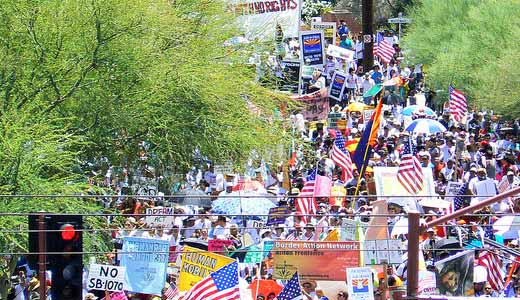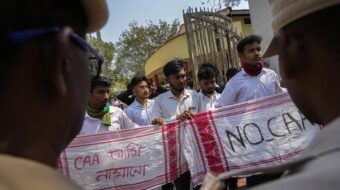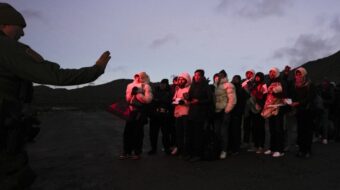
Federal District Judge Susan Bolton ruled Sept. 5 that Arizona can now start enforcing the “show me your papers” provision of the contentious anti-immigrant state law known as SB1070.
The provision requires that state and local police ask to see evidence of legal status of individuals they stop for other reasons, if they have some sort of reason to suspect that they are in the country without authorization.
SB 1070 was passed in 2010 and was challenged in court by the Obama administration, who argued that the law illegally infringed on the prerogative of the federal government to deal with immigration issues, and by the ACLU and labor and civil rights organizations, who focused on the racial profiling issue. In an earlier ruling, Bolton struck down some aspects of the law but only suspended enforcement of the “show me your papers” part. In yesterday’s ruling she referred to a position taken by the Supreme Court that the law could not be challenged on the grounds of violation of rights until specific cases could be presented in which it was shown that this is indeed happening.
Opponents of the law had complained that this gives a green light to racially profile members of the public. Past experience all over the country has shown that “reasonable suspicion” of undocumented status sometimes turns out to be things like physical appearance or dress. Not only Latinos who are citizens or permanent residents, but also Native American people whose ancestors have lived in the United States for thousands of years have complained about this kind of profiling. The noted Native American poet and essayist, Leslie Marmon Silko, born and raised in Laguna Pueblo in New Mexico, vividly described such an experience at the hands of the US Border Patrol in her essay “Border Patrol State.” Now it is feared that every state and local police officer will be able to do the same. The Arizona law has been copied in a number of other states in the Southeastern U.S. In Alabama, to give one example, it has led to an exodus of Latino people from some communities.
One positive aspect of Bolton’s ruling is that she struck down an additional aspect of SB 1070, which would have criminalized harboring undocumented immigrants, as clashing with federal law. Many Latino households in the United States are “multiple status”: The husband may be a legal resident, the wife and the oldest child undocumented, and the youngest children born U.S. citizens, or some other combination.
Anti-immigrant ideologues in Arizona and beyond, including Republican Governor Jan Brewer, hailed the decision. The American Civil Liberties Union, Latino and civil rights organizations denounced it, and stated that they would now be carefully watching its enforcement and will likely be back in court on this issue.
The court’s decision comes in the middle of the election season debate on immigration policy. The Republican Party and its presidential candidate, Mitt Romney, have taken a hard line, defending the Arizona law and similar ones in other states, and Romney has announced that his strategy will be to make life so hard for undocumented immigrants and their families that they will “self deport.”
The Obama administration has disappointed many immigrants’ rights activists with a high level of deportations and a failure to push hard enough legislation in Congress that would provide a “comprehensive immigration reform” whereby non-criminal undocumented immigrants could legalize themselves and eventually apply for citizenship.
But over the last year and a half, there have been executive decisions by the administration that have been greeted by immigrants’ rights activists as small steps in the right direction.
The first initiative is called “prosecutorial discretion,” whereby immigration authorities are authorized to indefinitely suspend deportation proceedings against undocumented immigrants who have not been convicted of serious crimes. The implementation of this initiative is problematic as many officials of the ICE, the federal immigration authority, are interpreting “serious crimes” in an overly strict manner.
The second program, now underway, has been the issuance of two-year suspensions of deportability, plus work permits, for over a million young people who were brought to this country without papers when they were younger than 16 years old. This program began on August 15, and all over the country community centers are seeing long lines of people coming to get help to fill out the paper work.
The third program, about to be implemented, would make it much easier for undocumented husbands and wives of U.S. citizens to get legal status; they would no longer have to return to their country of origin to apply for a visa, which in the past triggered a prohibition against their returning to the United States for up to 10 years.
All of these measures are precarious and do not help more than a part of the 11 million undocumented estimated to be in the United States, or many legally present non-citizens who have got into trouble with U.S. immigration authorities. However, they create a clear contrast between the harsh attitude of the Republican Party and its candidates and what might still be achieved under the Democrats. It is clear that if Romney and the Republicans win the elections, even these small-scale gains will be wiped out.
Undocumented immigrants, and documented immigrants without U.S. citizenship, cannot vote, but they have relatives, friends, co-workers and neighbors who can and do, and now have another reason to make sure the G.O.P. does not win in November.
Photo: A 2010 march against the law in Phoenix, Ariz. Xomiele // CC 2.0












Comments